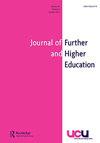英国高等教育中教职员工和学生之间的职业界限:学生对个人和性互动的舒适程度
IF 2.4
Q1 EDUCATION & EDUCATIONAL RESEARCH
引用次数: 1
摘要
“专业界限”的概念——广泛应用于成年人之间的专业关系受到监管的部门——在高等教育(HE)中并不常用来理解和表示教师或员工与学生之间的适当关系。然而,近年来,如何规范教职员工与学生之间的性关系和恋爱关系的问题已经成为国际高等教育机构中一个不断发展的政策问题。为了促进这一领域经验丰富的政策制定,本文利用英国开展的一项全国性调查的1492名学生的数据,探讨了学生对教职员工不同性别化和非性别化行为的舒适程度,该调查最初发表在全国学生联盟的报告《学院的权力》(2018年)上。对这些数据进行了新的分析,概述了“个人”和“性化”互动的尺度,揭示了不同学生群体的舒适和不适模式,最明显的是女性、LGBTQ+学生、黑人和亚洲学生。该分析确定了不同学生群体关心的与教职员工互动的领域,对现有的政策框架提出了质疑,如利益冲突政策和对本科生和研究生的不同程度的监管。根据这些发现,本文提出了两点建议:第一,应将专业边界培训纳入高等教育教学资格,第二,在学术部门和专业协会内部制定关于专业边界的共同规范。本文章由计算机程序翻译,如有差异,请以英文原文为准。
Professional boundaries between faculty/staff and students in UK higher education: students’ levels of comfort with personal and sexualised interactions
ABSTRACT The concept of ‘professional boundaries’ – widely used in sectors where professional relationships between adults are regulated – has not commonly been drawn on in higher education (HE) to understand and denote appropriate relationships between faculty or staff and students. Nevertheless, in recent years the question of how to regulate sexual and romantic relationships between faculty/staff and students has been a developing policy concern within HE institutions internationally. In order to contribute to empirically-informed policy development in this area, this article explores students’ levels of comfort with different sexualised and non-sexualised behaviours from staff/faculty, drawing on data from 1492 students from a national survey carried out in the United Kingdom, initially published in the National Union of Students’ report Power in the Academy (2018). New analysis on this data is introduced, outlining scales of ‘personal’ and ‘sexualised’ interactions, which reveal the patterns of comfort and discomfort across different demographic groups of students, most notably women, LGBTQ+ students, and Black and Asian students. The analysis identifies areas of interaction with staff/faculty that are of concern to different groups of students, calling into question existing policy frameworks such as conflict of interest policies and varying levels of regulation for undergraduate and postgraduate students. In the light of these findings, the article makes two recommendations: first, that training on professional boundaries should be included in higher education teaching qualifications, and second, for the development of shared norms around professional boundaries within academic departments and professional societies.
求助全文
通过发布文献求助,成功后即可免费获取论文全文。
去求助
来源期刊

JOURNAL OF FURTHER AND HIGHER EDUCATION
EDUCATION & EDUCATIONAL RESEARCH-
CiteScore
5.20
自引率
4.30%
发文量
80
期刊介绍:
Journal of Further and Higher Education is an international, peer-reviewed journal publishing scholarly work that represents the whole field of post-16 education and training. The journal engages with a diverse range of topics within the field including management and administration, teacher education and training, curriculum, staff and institutional development, and teaching and learning strategies and processes. Through encouraging engagement with and around policy, contemporary pedagogic issues and professional concerns within different educational systems around the globe, Journal of Further and Higher Education is committed to promoting excellence by providing a forum for scholarly debate and evaluation. Articles that are accepted for publication probe and offer original insights in an accessible, succinct style, and debate and critique practice, research, theory. They offer informed perspectives on contextual and professional matters and critically examine the relationship between theory and practice across the spectrum of further and higher education.
 求助内容:
求助内容: 应助结果提醒方式:
应助结果提醒方式:


